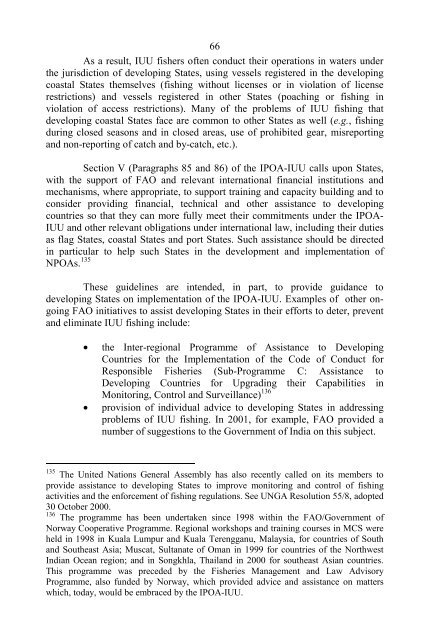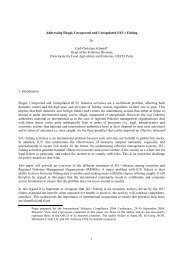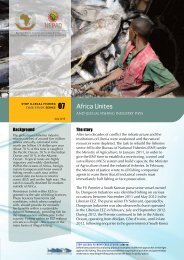658.3.9 Cooperation among RFMOs and between RFMOs and other<strong>International</strong> OrganizationsFinally, RFMOs should enhance the coordination <strong>of</strong> their actions toprevent, deter and eliminate <strong>IUU</strong> fishing. Many RFMOs and related institutionshave begun to do so, or at least have expressed the intention <strong>of</strong> doing so. 131 Inparticular, RFMOs must increase the speed and scope <strong>of</strong> the exchange <strong>of</strong>information on <strong>IUU</strong> fishing, particularly with respect to fleet movement,compliance, management and trade. 132While the mobility <strong>of</strong> fishing fleets makes cooperation among allRFMOs a necessity, this is particularly true in regions where <strong>IUU</strong> fishing is theconcern <strong>of</strong> two or more RFMOs. One possibility for reducing <strong>IUU</strong> fishingthroughout such a region would be to link measures adopted by one RFMO withthose <strong>of</strong> the others in that region. For example, ICCAT, NAFO, NEAFC, GFCMand SEAFO could conceivably have an interlocking system for port Statemeasures with respect to fisheries in the Atlantic region. 133Other international organizations and mechanisms can contribute toimplementation <strong>of</strong> the <strong>IPOA</strong>-<strong>IUU</strong> as well. In 1999, for example, the APECFisheries Working Group adopted recommendations on the issuance <strong>of</strong> “flags <strong>of</strong>convenience” and on <strong>IUU</strong> fishing. These actions recommended that each APECmember economy, among other things, discourage its nationals and companiesfrom engaging in activities on fishing vessels that are undermining fisheryconservation and management regimes, and promote international cooperationfor progressively eliminating such activities. The recommendations also calledupon member economies to participate fully in efforts to deal effectively with allforms <strong>of</strong> <strong>IUU</strong> fishing, including fishing by vessels flying “flags <strong>of</strong>convenience.” 1349. SPECIAL REQUIREMENTS OF DEVELOPING COUNTRIESDeveloping States, particularly small island developing States and otherdeveloping coastal States, are among those that suffer the most from the adverseeffects <strong>of</strong> <strong>IUU</strong> fishing. With the exception <strong>of</strong> some developing States with largefishery sectors, most governments in developing States lack the resources andinfrastructure to monitor and enforce capture fishery regulations effectively.131 CCAMLR, CCSBT, FFA, IATTC, IBSFC, ICCAT, IOTC, NAFO, NASCO, NEAFCand NPAFC report participation in, or plans for, coordination with other RFMOs.132 J. Swan, supra note 113.133 For further discussion <strong>of</strong> this concept, see T. Lobach, supra note 34.134 M. Komatsu, supra note 20.
66As a result, <strong>IUU</strong> fishers <strong>of</strong>ten conduct their operations in waters underthe jurisdiction <strong>of</strong> developing States, using vessels registered in the developingcoastal States themselves (fishing without licenses or in violation <strong>of</strong> licenserestrictions) and vessels registered in other States (poaching or fishing inviolation <strong>of</strong> access restrictions). Many <strong>of</strong> the problems <strong>of</strong> <strong>IUU</strong> fishing thatdeveloping coastal States face are common to other States as well (e.g., fishingduring closed seasons and in closed areas, use <strong>of</strong> prohibited gear, misreportingand non-reporting <strong>of</strong> catch and by-catch, etc.).Section V (Paragraphs 85 and 86) <strong>of</strong> the <strong>IPOA</strong>-<strong>IUU</strong> calls upon States,with the support <strong>of</strong> FAO and relevant international financial institutions andmechanisms, where appropriate, to support training and capacity building and toconsider providing financial, technical and other assistance to developingcountries so that they can more fully meet their commitments under the <strong>IPOA</strong>-<strong>IUU</strong> and other relevant obligations under international law, including their dutiesas flag States, coastal States and port States. Such assistance should be directedin particular to help such States in the development and implementation <strong>of</strong>NPOAs. 135These guidelines are intended, in part, to provide guidance todeveloping States on implementation <strong>of</strong> the <strong>IPOA</strong>-<strong>IUU</strong>. Examples <strong>of</strong> other ongoingFAO initiatives to assist developing States in their efforts to deter, preventand eliminate <strong>IUU</strong> fishing include:the Inter-regional Programme <strong>of</strong> Assistance to DevelopingCountries for the <strong>Implementation</strong> <strong>of</strong> the Code <strong>of</strong> Conduct forResponsible Fisheries (Sub-Programme C: Assistance toDeveloping Countries for Upgrading their Capabilities inMonitoring, Control and Surveillance) 136provision <strong>of</strong> individual advice to developing States in addressingproblems <strong>of</strong> <strong>IUU</strong> fishing. In 2001, for example, FAO provided anumber <strong>of</strong> suggestions to the Government <strong>of</strong> India on this subject.135 The United Nations General Assembly has also recently called on its members toprovide assistance to developing States to improve monitoring and control <strong>of</strong> fishingactivities and the enforcement <strong>of</strong> fishing regulations. See UNGA Resolution 55/8, adopted30 October 2000.136 The programme has been undertaken since 1998 within the FAO/Government <strong>of</strong>Norway Cooperative Programme. Regional workshops and training courses in <strong>MCS</strong> wereheld in 1998 in Kuala Lumpur and Kuala Terengganu, Malaysia, for countries <strong>of</strong> Southand Southeast Asia; Muscat, Sultanate <strong>of</strong> Oman in 1999 for countries <strong>of</strong> the NorthwestIndian Ocean region; and in Songkhla, Thailand in 2000 for southeast Asian countries.This programme was preceded by the Fisheries Management and Law AdvisoryProgramme, also funded by Norway, which provided advice and assistance on matterswhich, today, would be embraced by the <strong>IPOA</strong>-<strong>IUU</strong>.
- Page 4 and 5:
iiiPREPARATION OF THIS DOCUMENTThe
- Page 6 and 7:
vThe IPOA-IUU is voluntary. However
- Page 8 and 9:
viii6.2 Examples of some port State
- Page 10 and 11:
xiBACKGROUND1. From ancient times,
- Page 12 and 13:
xiii11. The Code is voluntary. Howe
- Page 14 and 15:
1. INTERNATIONAL PLAN OF ACTION - I
- Page 16 and 17:
3Since the late 1990s, a number of
- Page 18 and 19:
5(1) conducted by national or forei
- Page 20 and 21:
7flag States, coastal States and Po
- Page 22 and 23:
9In light of this, the very first
- Page 24 and 25:
11the vessels rarely if ever visit
- Page 26 and 27:
13For example, Japan requires its n
- Page 28 and 29: 15IUU fishing on the high seas. 27
- Page 30 and 31: 17end all forms of government econo
- Page 32 and 33: 19developing States, 36 have introd
- Page 34 and 35: 21If the vessel is fishing on the h
- Page 36 and 37: 23registering a vessel that has a h
- Page 38 and 39: 25RFMOs have a role to play in ensu
- Page 40 and 41: 27FAO, in turn, will make available
- Page 42 and 43: 29species can be caught, what gear
- Page 44 and 45: 31Flag States are also encouraged t
- Page 46 and 47: 33cases, fishing vessels registered
- Page 48: 35light of this, paragraph 51 of th
- Page 51 and 52: 38transshipment at sea is prohibite
- Page 53 and 54: 40supported IUU fishing. For exampl
- Page 55 and 56: 42Japan prohibits port calls by tun
- Page 57 and 58: 44of a NAFO member, it must be insp
- Page 59 and 60: 46discussed in Section 7 of these g
- Page 61 and 62: 48products harvested through IUU fi
- Page 63 and 64: 50products. On the basis of that da
- Page 65 and 66: 52question, while the latter only c
- Page 67 and 68: 54States can also combat IUU fishin
- Page 69 and 70: 56RFMOs engage in IUU fishing. No s
- Page 71 and 72: 588.3 Possibilities for Further Act
- Page 73 and 74: 60resolutions calling on those memb
- Page 75 and 76: 62landings, port control, and inspe
- Page 77: 648.3.8 Actions in Response to Rema
- Page 81 and 82: 68A number of other developed State
- Page 83 and 84: 702.4 Measures to control transport
- Page 85 and 86: 10.3 Suggested Format for Reports t
- Page 87 and 88: 74Flag States should closely contro
- Page 89 and 90: 76A coastal State should consider r
- Page 91 and 92: 78To assist States in implementing
- Page 93 and 94: 12. LITERATURE CITED80Agnew, D.J. 2
- Page 95 and 96: 82Greenpeace. 2001. Pirate Fishing:
- Page 97 and 98: 84II. NATURE AND SCOPE OF IUU FISHI
- Page 99 and 100: 86to the Conservation and Managemen
- Page 101 and 102: National Legislation88Legislation16
- Page 103 and 104: 90National Plans of Action25. State
- Page 105 and 106: 9236.2 having taken into account al
- Page 107 and 108: 9446.3 the species, fishing gear au
- Page 109 and 110: 9651.2 cooperation and exchange of
- Page 111 and 112: 98general operating guidelines for
- Page 113 and 114: 100and should consider measures to
- Page 115 and 116: 10280.9 development of observer pro
- Page 117 and 118: 10486.3 the strengthening of region
- Page 119 and 120: 106Articles V, VI, and VII of the A
- Page 121 and 122: 1084.2 To the greatest extent pract
- Page 123 and 124: 110• Compliance with other aspect
- Page 125 and 126: 1126. Information regarding such si
- Page 127 and 128: 114Annex ACommon English Name Scien
- Page 129 and 130:
1164. Parties shall consider and ac
- Page 131 and 132:
118Committed to take steps, consist
- Page 133 and 134:
1209. An export-validated Dissostic
- Page 135:
122APPENDIX VIWEBSITES OF SELECTED
















